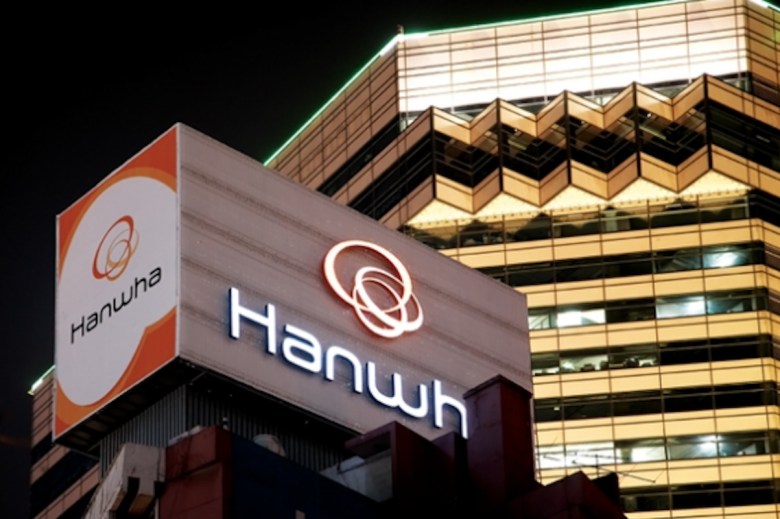Politics
Hanwha’s Ambitious Gamble Backfires in US-China Trade Tensions

The South Korean conglomerate, Hanwha Group, has faced backlash after its recent lobbying efforts in the United States led to unintended consequences for both its business interests and South Korea’s international standing. The company, which owns the solar subsidiary Qcells, sought to impose new tariffs on Chinese solar modules that are processed in Southeast Asia, framing the initiative as a means to bolster “US energy security.” However, this move has alienated American solar developers and raised concerns over the stability of regional supply chains.
Hanwha’s campaign, intended to protect its market share, has resulted in destabilizing effects within the solar industry. Initially, Qcells was viewed as a model for foreign investment under the Biden Administration’s clean energy agenda. The subsidiary established factories in Georgia, creating local jobs and benefitting from substantial tax credits through the Inflation Reduction Act. Yet, as Chinese companies began exporting cheaper solar panels via countries like Malaysia, Vietnam, Thailand, and Cambodia—regions the US considers vital for diversifying supply chains—Hanwha opted for a political response instead of innovating or enhancing efficiency.
This strategy of demanding tariffs under the guise of fighting “circumvention” not only appeared as rent-seeking masked in patriotism but also overlooked a crucial fact: Southeast Asia serves as a strategic lifeline for the US. The potential punishment of these trading partners could jeopardize the very networks that sustain regional cooperation and alignment with Western interests.
The reaction from the US solar sector was swift and severe. Developers warned of potential project cancellations and increased costs. Utilities expressed hesitance, and even within Washington, Hanwha’s actions raised questions about South Korea’s commitment to partnership over protectionism.
Misreading the Strategic Landscape
Hanwha’s situation underscores a broader trend among middle powers, where nations misinterpret US intentions. The United States is not pursuing a complete decoupling from China; rather, it is promoting managed interdependence. Washington aims to secure critical industries such as semiconductors and defense while maintaining flexibility in less contentious sectors. When allies like South Korea advocate for extreme anti-China measures, they risk crossing a line that transforms them from valuable partners into political nuisances.
For South Korea, the stakes are particularly significant due to its reliance on both US technology and Chinese markets. Aligning too closely with one superpower can provoke retaliatory measures from the other, a precarious balancing act for corporations like Hanwha. When firms treat US politics as a negotiating table rather than a strategic alliance, they compromise South Korea’s most valuable asset—trust.
Middle-Power Challenges in a Multipolar World
Hanwha’s miscalculation is not an isolated incident. Many middle powers are navigating similar challenges. For instance, Turkey is attempting to balance arms deals with Russia while maintaining NATO loyalty, stirring suspicion from both sides. Saudi Arabia is adeptly leveraging its oil resources to negotiate concessions from both Beijing and Washington. Meanwhile, India manages to engage with the Quad while simultaneously deepening trade relations with China and Russia.
Success in this intricate geopolitical game relies on restraint. Middle powers can exert influence by aligning with global currents rather than attempting to defy them. Hanwha misjudged the dynamics of US-China tensions, confusing access for influence and influence for control.
As South Korea confronts the repercussions of this misstep, it faces a critical juncture. The nation’s prosperity hinges on globalization, yet its political landscape increasingly rewards nationalist rhetoric. When private corporations act as independent geopolitical players without strategic alignment, they risk creating contradictions in national policy.
The onus is also on Washington. Its industrial policies encourage allied involvement without fostering protectionist tendencies. When allies demand special exemptions under the guise of “friend-shoring,” they may inadvertently undermine the coalitions designed to enhance supply-chain resilience.
Ultimately, the key lies in realigning incentives with national interests. Hanwha’s experience illustrates how corporate profit motives can diverge from those interests, leading to unintentional sabotage of alliances.
As global blocs like AUKUS, BRICS, and the Indo-Pacific Economic Framework expand, the temptation to exploit great-power rivalries will intensify. However, enduring significance in this evolving landscape will not stem from opportunistic lobbying or moral posturing, but rather from reliability and trust. Countries that overreach risk isolation, while those that balance agility with discipline are positioned to earn sustained influence.
Hanwha’s misstep serves as a pressing reminder: in today’s uncertain geopolitical environment, restraint is a form of power. Middle powers that confuse temporary political openings for permanent leverage may find themselves sidelined in a contest beyond their control. The true test lies not in defiance or dependence, but in disciplined realism—recognizing when to assert, when to concede, and when to focus on constructive engagement. In both geopolitics and business, overreach remains a swift path to irrelevance.
-

 Lifestyle3 months ago
Lifestyle3 months agoHumanism Camp Engages 250 Youths in Summer Fest 2025
-

 Sports3 months ago
Sports3 months agoDe Minaur Triumphs at Washington Open After Thrilling Comeback
-

 Business4 months ago
Business4 months agoKenvue Dismisses CEO Thibaut Mongon as Strategic Review Advances
-

 Sports4 months ago
Sports4 months agoTupou and Daugunu Join First Nations Squad for Lions Clash
-

 Top Stories4 months ago
Top Stories4 months agoColombian Senator Miguel Uribe Shows Signs of Recovery After Attack
-

 World4 months ago
World4 months agoASEAN Gears Up for Historic Joint Meeting of Foreign and Economic Ministers
-

 Business4 months ago
Business4 months agoOil Prices Surge Following New EU Sanctions on Russia
-

 Entertainment3 months ago
Entertainment3 months agoDetaşe-Sabah Violin Ensemble Captivates at Gabala Music Festival
-

 Health3 months ago
Health3 months agoNew Study Challenges Assumptions About Aging and Inflammation
-

 Entertainment3 months ago
Entertainment3 months agoBaku Metro Extends Hours for Justin Timberlake Concert
-

 Business4 months ago
Business4 months agoU.S. House Approves Stablecoin Bill, Sends to Trump for Signature
-

 Top Stories4 months ago
Top Stories4 months agoRethinking Singapore’s F&B Regulations Amid Business Closures









